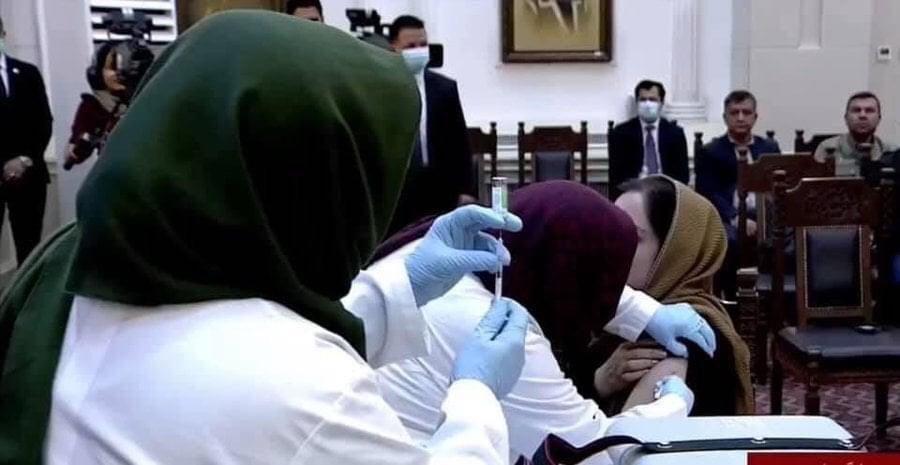KABUL (Pajhwok): Afghanistan received COVID-19 vaccine doses shipped via the COVAX facility, a partnership between CEPI, Gavi, UNICEF and WHO, according to a statement on Monday.
This is a historic step towards the goal to ensure equitable distribution of COVID-19 vaccines globally, in what will be the largest vaccine procurement and supply operation in history.
The delivery is part of a first wave of arrivals that will continue in the coming weeks and months.
On 08 March 2021, COVAX shipped 468,000 doses of the COVISHIELD vaccine, from the Astra Zeneca Serum Institute of India, in Mumbai.
It arrived in the afternoon of Monday March 8, on an Emirates flight, at the Hamid Karzai International Airport.
The arrival in Kabul marks a milestone moment. Afghanistan is the first country in central Asia to receive the vaccine via the COVAX – the facility that is set to deliver at least 2 billion doses of COVID-19 vaccines by the end of 2021.
In addition to 468,000 doses of vaccines, 470,000 syringes and 4,700 safety boxes were also part of the shipment.
“The arrival of the first COVAX doses today is a major milestone. Gavi looks forward to continuing our collaboration with the people of Afghanistan and partners to ensure the smooth and equitable distribution of vaccines to those most in need. It is going to be challenging, but if we all maintain momentum and keep working together, we will defeat this pandemic,” said Ricard Lacort, Senior Country Manager Afghanistan and Djibouti for Gavi.
Sheema Sen Gupta, UNICEF Afghanistan Representative a.i.. said, “This is a great day for the people of Afghanistan. The imminent roll-out of the COVAX facilitated COVID-19 vaccine means that around 234,000 people, including teachers, will be better protected from the ravages of the COVID-19 virus.
UNICEF is especially pleased that the Ministry of Health and the Ministry of Education have included teachers as a priority for this wave of vaccines ahead of back to school on March 21. Together, our priority is to open all schools and get all of Afghanistan’s children back to their classes, their studies, and their friends.”
Dr. David Lai, WHO Officer-In-Charge said, “The COVID-19 vaccine is a huge step forward in our fight against the pandemic. Ensuring the quality, safety and efficacy of the vaccine has been one of WHO’s highest priorities but vaccines only work when they are combined with public health strategies.
We did not get here in one day and we won’t get out in one day either but today our hope is renewed. The endgame is clear. However, Afghanistan will need continued support from the international community to ensure the country which is already affected by decades-long conflict and insecurity doesn’t get left behind in the race to end COVID-19.”
“The Ministry of Public Health of the Government of Islamic Republic of Afghanistan is further enabled to fight the COVID-19 pandemic by rolling out the vaccine,” said Dr. Wahid Majrooh, Acting Minister of Public Health.
“The MoPH appreciates the COVAX facility and the international donors for their continued support. We must accelerate our efforts to ensure that all eligible Afghans are vaccinated and protected from COVID-19, as it is the most important step to put an end to this pandemic.”
For several months, COVAX partners have been supporting governments and partners in readiness efforts, in preparation for this moment. They have been especially active in working with some of the
world’s poorest countries: those that will benefit from the Advance Market Commitment (AMC), an innovative financial mechanism to help secure global and equitable access for COVID-19 vaccines.
This includes assisting with the development of national vaccination plans, support for cold chain infrastructure, as well as stockpiling of half a billion syringes and safety boxes for their disposal, masks, gloves and other equipment to ensure that there is enough equipment for health workers to start vaccinating priority groups as soon as possible.
In order for doses to be delivered to COVAX Facility participants via this first allocation round, several critical pieces must be in place, including confirmation of national regulatory authorization criteria related to the vaccines delivered, indemnification agreements, national vaccination plans from AMC participants, as well as other logistical factors such as export and import licenses.
As participants fulfil the above criteria and finalize readiness preparations, COVAX will issue purchase orders to the manufacturer and ship and deliver doses via an iterative process. This means deliveries for the first round of allocation will take place on a rolling basis and in tranches.
As vaccines start to roll out around the world, they should complement, and not replace, proven public health measures. It is also important to expand access to rapid diagnostics and treatments, such as oxygen and dexamethasone, as advocated for by the ACT Accelerator. Countries must also continue to apply tried-and-tested measures to successfully prevent and control transmission, such as physical distancing, masks, ventilation and hand hygiene, alongside robust programs to test, trace, isolate and treat.
COVAX has built a diverse portfolio of vaccines suitable for a range of settings and populations, and is on track to meet its goal of delivering at least 2 billion doses of vaccine to participating countries around the globe in 2021, including at least 1.3 billion donor-funded doses to the 92 lower-income COVAX Facility participants supported by the Gavi COVAX AMC.
COVAX, the vaccines pillar of the Access to COVID-19 Tools (ACT) Accelerator, is co-led by the Coalition for Epidemic Preparedness Innovations (CEPI), Gavi, the Vaccine Alliance and the World Health Organization (WHO) – working in partnership with UNICEF as the key implementing partner, as well as civil society organizations, vaccine manufacturers, the World Bank, and others.
Pr/nh








GET IN TOUCH
NEWSLETTER
SUGGEST A STORY
PAJHWOK MOBILE APP